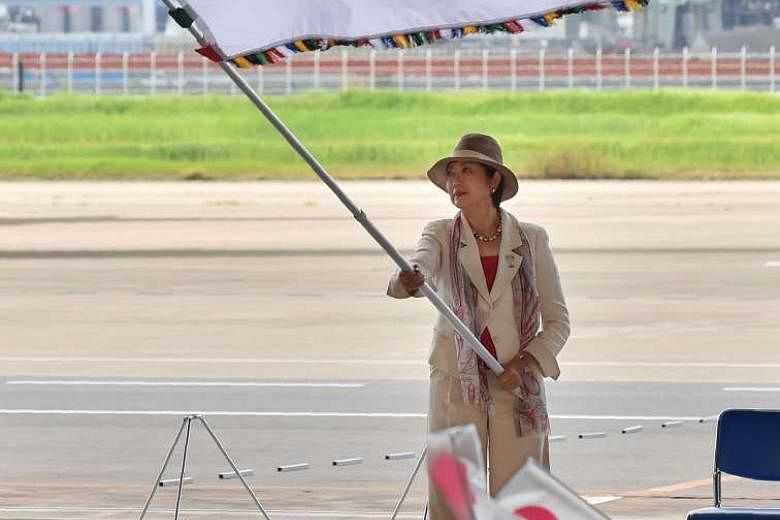TOKYO • The Olympic flag arrived in Tokyo yesterday as Japan's capital gears up to host the 2020 Games, with officials promising smooth sailing after Rio's sometimes shaky instalment.
Tokyo Governor Yuriko Koike carried the flag during a ceremony at Haneda airport after stepping off a plane from the Brazilian host city. She was accompanied by the Japanese team, whose members won a record 41 medals in Rio.
"I feel the full weight of the responsibility that this (flag) brings," Koike told the crowd.
"I'm very happy that we're able to bring the flag back after more than 50 years."
Tokyo last hosted the Summer Olympics in 1964, highlighting Japan's post-war emergence as a global economic powerhouse.
"I hope we can revive the same emotion we felt in Rio at the Tokyo Olympics," said Saori Yoshida, a silver medallist wrestler and captain of the Rio delegation.
A kimono-clad Koike received the flag at the closing ceremony in Rio, where thousands of fans and athletes donned ponchos on a wet and windy night for a colourful festival of Brazilian culture and music with bursts of fireworks.
Japan's Prime Minister Shinzo Abe made a surprise comical cameo as Nintendo video game character Super Mario while Tokyo set a light-hearted tone for its hosting of the Games in four years.
"I wanted to show Japan's soft power to the world with the help of Japanese characters," Mr Abe told reporters.
Japan promoted itself as a safe pair of hands to host the event and Mr Abe pledged in Rio that he would try to make them the best Games yet.
But Tokyo's Olympic preparations have suffered high-profile setbacks, including the scrapping of plans for the main stadium, which led to delays in construction, and plagiarism allegations which forced organisers to ditch the original logo for the Games.
French prosecutors have also launched an investigation into alleged bribes linked to Tokyo's winning Olympic bid, which organisers have denied.
Koike, who was elected in July as Tokyo's first female governor, has ordered officials to rein in ballooning costs and has also pledged a formal review.
That came as concerns grow over soaring costs which could potentially double or even triple from the reported original forecast of US$7.14 billion (S$9.68 billion).
The Games were awarded to Tokyo in 2013, with the expectation that they would be a model of efficiency in a city calling itself "peaceful, reliable, safe and stable".
Tokyo has a population of more than 35 million people, but the streets are safe, trains run on time and the air is clean.
And because of strict gun control and a public honesty visitors find disarming, few people ever experience serious crime.
The country is prone to natural disasters, particularly earthquakes, but strict building codes means they often pass with little or no damage.
AGENCE FRANCE-PRESSE, REUTERS

